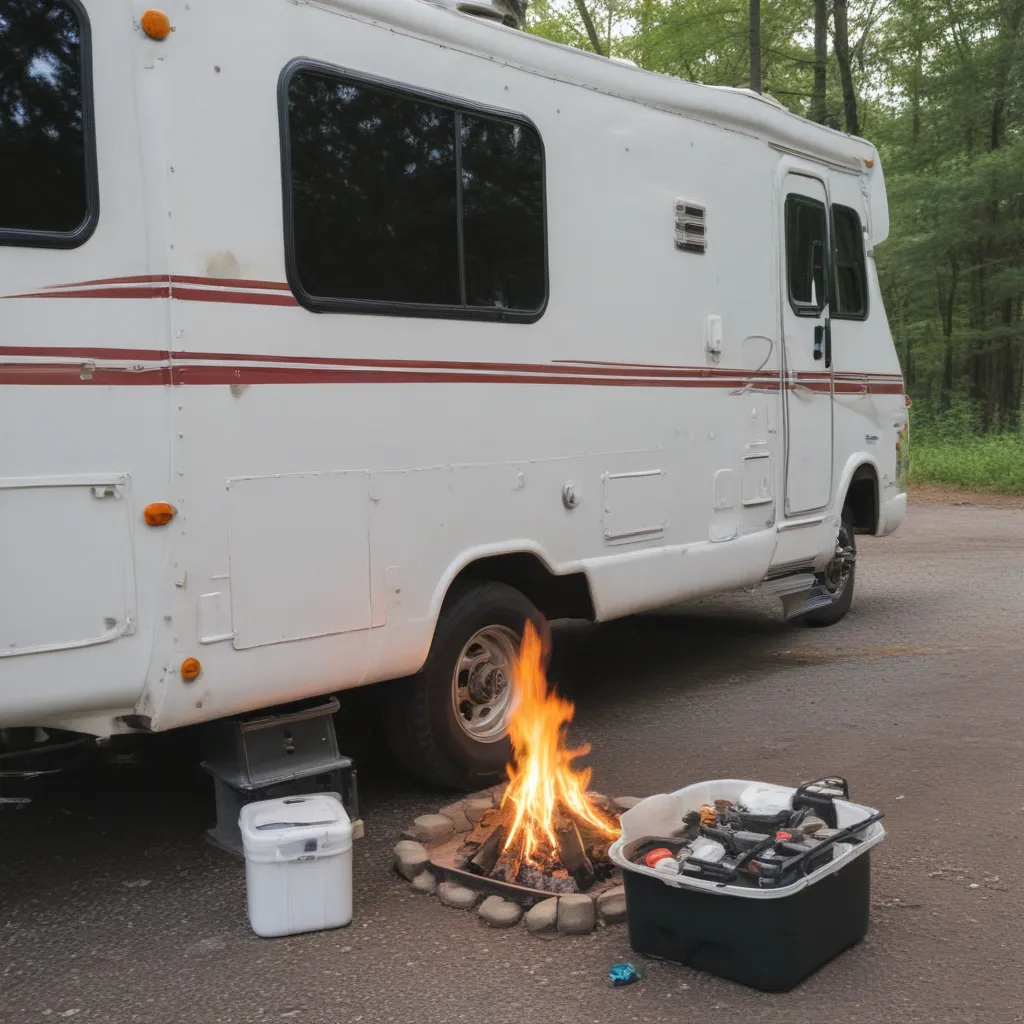
The Perils of Propane: A Cautionary Tale
Ahh, the joys of RV life – the open road, the crisp mountain air, and the sizzle of a well-cooked steak on the propane grill. What could possibly go wrong? Well, my friends, let me tell you a tale that will make your hair stand on end (just be sure to keep that pilot light away from it).
It was a sunny day in Orange County, and I was gearing up for a much-anticipated trip to Yosemite. I had meticulously checked my rig, ensuring every system was in tip-top shape – or so I thought. As I fired up the propane stove to whip up a hearty breakfast, I was greeted by a sound that can chill any RVer to the core: a faint hissing, like the whisper of a venomous snake.
Identifying Propane Leaks: The First Line of Defense
The first step in troubleshooting any propane issue is to check for leaks. These pesky little buggers can be the root cause of a wide range of problems, from annoying interruptions in your culinary endeavors to downright dangerous situations. So, how do you go about sniffing out these elusive leaks?
Well, my friends, it’s all about using your senses. Start by giving your propane system a good visual inspection. Look for any cracks, holes, or loose connections in the lines, fittings, and appliances. If you spot something suspicious, break out the good old soapy water solution and give it a thorough testing. Those little bubbles will give up the ghost every time.
But wait, there’s more! Don’t forget to use your nose. Propane has a distinct, unpleasant odor that’s designed to alert you to any potential issues. If you catch a whiff of that rotten-egg scent, it’s time to spring into action.
Troubleshooting Propane System Malfunctions
Alright, so you’ve identified a leak. Now what? Well, my fellow RV enthusiasts, the troubleshooting journey has only just begun. Propane systems are complex beasts, and the issues you might encounter can range from the relatively simple to the downright puzzling.
Let’s start with a common problem: a faulty regulator. This little guy is responsible for maintaining the proper pressure in your propane lines, and when it goes haywire, it can wreak havoc on your entire system. Is your stove or furnace just not performing like it used to? Chances are, the regulator is to blame. The good news is, these can be relatively easy to replace – just make sure you turn off the propane supply first, and always consult a professional if you’re unsure.
But what if the issue is a bit more elusive? Say, for example, you’re experiencing inconsistent or erratic performance from your appliances. This could be a sign of a blockage in the propane lines or even a problem with the tank itself. Time to break out the detective hat and start sleuthing.
Maintaining Propane Appliances: Keeping the Flames Burning Bright
Now, let’s talk about those beloved propane appliances – the heart and soul of any RV’s domestic bliss. From the trusty stove to the cozy furnace, these workhorses deserve a little TLC to keep them running smoothly.
One of the most important maintenance tasks is keeping those burners clean. Over time, those little holes can get clogged with gunk, causing uneven heating and frustrating hot-and-cold spots. Break out the toothpicks and get to work, my friends. And don’t forget to check the thermocouples – those little safety devices are crucial for preventing dangerous gas leaks.
But the real test of an RV enthusiast’s mettle comes when the furnace starts acting up. Ah, the joys of troubleshooting a finicky heating system! Is it a problem with the thermostat? A faulty igniter? The suspense is enough to make even the most seasoned RVer break out in a cold sweat.
Safety First: Protecting Yourself and Your RV
Let’s be honest, folks – propane is no joke. When it comes to RV systems, safety should always be the top priority. And that means knowing how to handle these volatile fuels with the utmost care and caution.
First and foremost, never, ever ignore a potential leak. The consequences can be downright terrifying – from fires and explosions to, well, let’s just say you don’t want to find out. At the first sign of trouble, shut off the propane supply and call in the experts. Trust me, your life is worth more than a few hours without hot water.
And while we’re on the topic of safety, let’s not forget about those pesky carbon monoxide alarms. These little guys are your early warning system against the silent killer, so keep them in tip-top shape and replace the batteries religiously. After all, you want to be able to enjoy your RV adventures, not end up in the emergency room.
Conclusion: Embracing the Challenges of Propane
Well, there you have it, my fellow RV enthusiasts – a comprehensive guide to navigating the perilous world of propane systems and appliances. From sniffing out leaks to keeping those burners clean, it’s a never-ending adventure filled with equal parts frustration and triumph.
But you know what they say – nothing worth having comes easy. And when it comes to RV life, that couldn’t be more true. So, embrace the challenges, sharpen your troubleshooting skills, and remember – safety first, always.
And if all else fails, there’s always the orangecountyrvrepair.com team, ready to lend a helping hand and keep your rig running like a dream. Happy trails, my friends!
